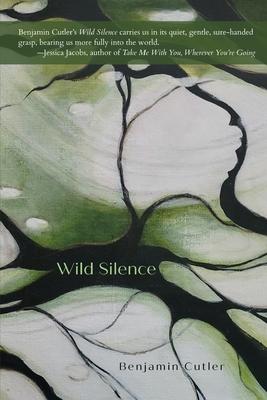From the opening pages in which we readers are addressed as "Friend" and urged "let us tie each frayed photon / into a new, far-reaching braid. // Light needs such quiet, gentle work," we are pulled into the embrace of a speaker who will walk with us into a light always dappled by the acknowledgement of waiting mortality, who will guide us into close and careful observation. We meet him as a boy, when he was shy "as a riverbed shadow" and "kept his prayers / as secret as any shedding faith," trading the beliefs of his parents for an abiding reverence for nature. With a steady resistance to those "who would only speak / in the language of an answer- / with-no-question," we witness the man he has become: adoring husband, concerned and loving father, messenger of an eco-grief that cries out to even the burrowed rabbit, "quivering like a fist," wishing it one "gold day . . . free of tooth and claw." Benjamin Cutler's Wild Silence carries us in its quiet, gentle, sure-handed grasp, bearing us more fully into the world.
Jessica Jacobs, author of Take Me With You, Wherever You're Going
While "grief / and laughter might begin in the belly" in Benjamin Cutler's newest collection, Wild Silence, these poems never fail to remind us that "every mouth is a window / open to the rain." It is at this window that Cutler beautifully renders a world of caring fathers, curious sons, wooded landscapes, indifferent animals, and lyrical insightfulness into moments of prayer, elegy, and gratitude. Even when Cutler's speaker mistakes "lamentation for laughter," there is keen understanding that life-whether near the Blue Ridge Mountains, in a personal garden, or at the edge of one season changing into the next-is as full of "dying" as it is of "loving," and no one encounter with one's surroundings or others should be taken for granted. The fire might be waning when you reach the end of Cutler's book, but like the "glowing coal" his speaker advises readers to carry with them when they leave, you too will carry these poems with you long after you've turned the last page.
Esteban Rodrguez, author of Ordinary Bodies and Before the Earth Devours Us
If, as Simone Weil once wrote, "absolutely unmixed attention is prayer," then the poems of Benjamin Cutler are prayers, blessings, devotions to the art of being here with others and ourselves. "I intend to hear everything," Cutler writes, and so he guides us into the "wild silence" to teach us, again and again, how to listen-to everything, to "every prayer that salts the air," to the "hopeless cries in the orange night," to the "marrow mystery" of our own miraculous being. The great "promise," he writes, "begins with wild silence." And so, with this Wild Silence, it does.
Joseph Fasano, author of The Crossing
